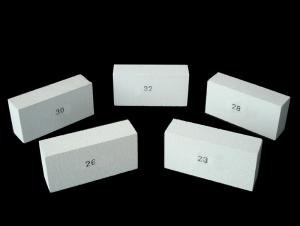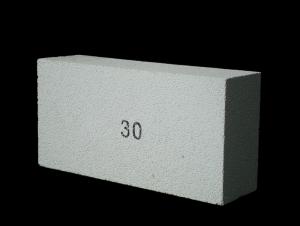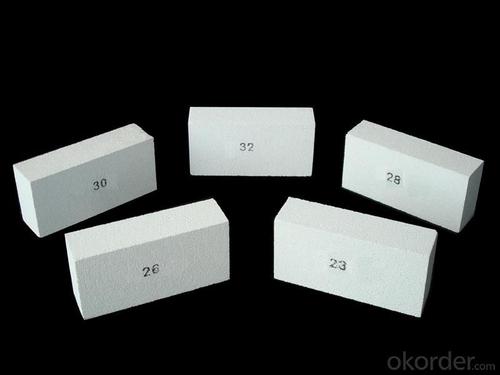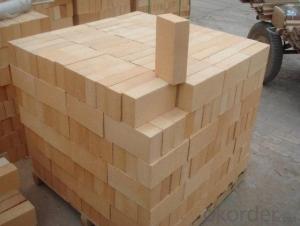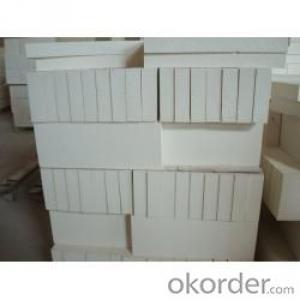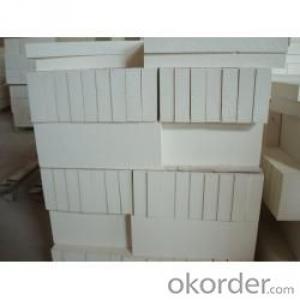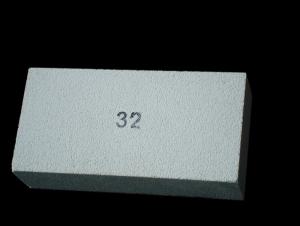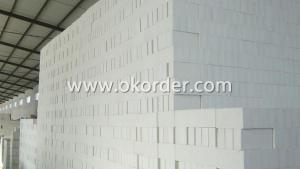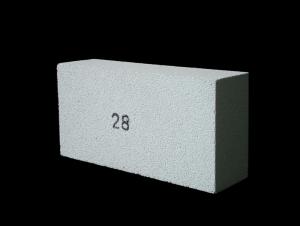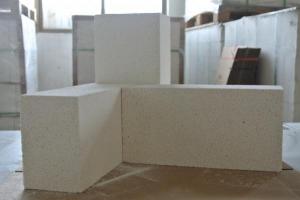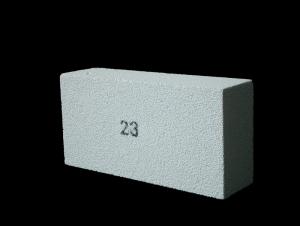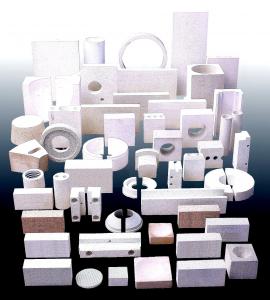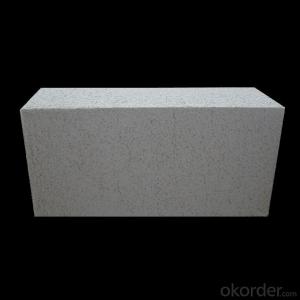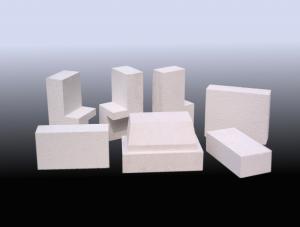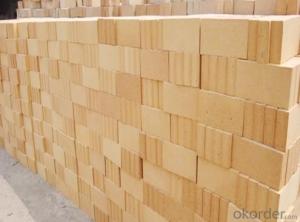Insulating Fire Brick - MS30
- Loading Port:
- China Main Port
- Payment Terms:
- TT or L/C
- Min Order Qty:
- 1000 pcs pc
- Supply Capability:
- 1000 Tons Per Month pc/month
OKorder Service Pledge
OKorder Financial Service
You Might Also Like
General Information of Insulating Fire Bricks MS30
Insulating fire brick MS30 are produced by mixing, extruding, drying, sintering and grinding. Our insulating fire bricks MS30 temperature is 1650℃(3000℉). We could supply a wide range of shapes.
Feature of Insulating Fire Bricks MS30
Light weight and low thermal conductivity
Low heat storage
Low iron and impurities
High thermal shock resistance
Application of Insulating Fire Bricks MS30
The insulating firebricks can be used as a hot face lining directly exposed to the heat or as a backup insulation layer in iron and steel mills, non-ferrous foundries, petrochemical, ceramic, glass.
Data Sheet of Insulating Fire Bricks MS30
|
| MS30 |
Physical Properties: |
|
|
Classifiction Temperature | ℃ | 1600.0 |
Density | Kg/m3 | 1000.0 |
Cold Crushing Strength | Mpa | 2.8 |
Reheating Linear Change(24hrs) |
|
|
1600℃ | % | 0.7 |
Hot Load Strength Deform(90 minutes) |
|
|
1370℃ at 0.069 Mpa(10psi) | % | 0.2 |
Thermal Conductivity |
|
|
400℃ | W/m.k | 0.3 |
600℃ | W/m.k | 0.3 |
800℃ | W/m.k | 0.4 |
1000℃ | W/m.k | 0.4 |
1200℃ | W/m.k | 0.4 |
Specific Heat | KJ/Kg.K | 1.1 |
Chemical Analysis: |
|
|
Al2O3 | % | 70.0 |
SiO2 | % | 28.3 |
Fe2O3 | % | 0.5 |
TiO2 | % | 0.1 |
CaO | % | 0.1 |
MgO | % | 0.1 |
Na2O+K2O | % | 0.7 |
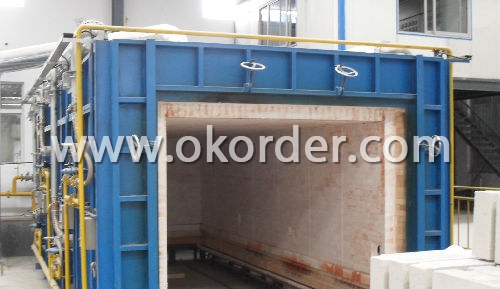
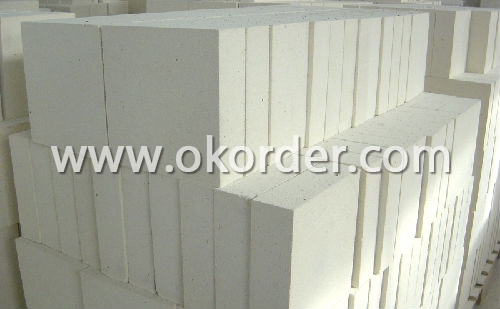
- Q: Are insulating fire bricks suitable for use in glass melting furnaces?
- Yes, insulating fire bricks are suitable for use in glass melting furnaces. Insulating fire bricks have high thermal resistance and low thermal conductivity, making them ideal for retaining heat and preventing heat loss in the furnace. Additionally, their lightweight and porous nature allow for efficient energy utilization and reduced fuel consumption.
- Q: Can insulating fire bricks be used in the construction of crucible furnaces?
- Yes, insulating fire bricks can be used in the construction of crucible furnaces. These bricks are designed to withstand high temperatures and provide excellent insulation, making them ideal for lining the walls of crucible furnaces. They help to retain heat, reduce energy consumption, and ensure efficient melting and casting processes.
- Q: Can insulating fire bricks be used in the construction of tundishes?
- Yes, insulating fire bricks can be used in the construction of tundishes. Insulating fire bricks are lightweight and have excellent thermal insulation properties, making them ideal for applications where heat retention is important. Tundishes, which are used in the steel industry to control the flow of molten metal, require materials that can withstand high temperatures and minimize heat loss. Insulating fire bricks can withstand the extreme temperatures found in tundishes, helping to maintain the desired temperature of the molten metal and preventing heat loss. Additionally, their lightweight nature makes them easier to handle and install in tundish construction. Overall, insulating fire bricks are a suitable choice for the construction of tundishes due to their thermal insulation properties and ability to withstand high temperatures.
- Q: Can insulating fire bricks be used for insulation in aluminum smelters?
- Yes, insulating fire bricks can be used for insulation in aluminum smelters. Insulating fire bricks are made from special lightweight materials that have high insulating properties, making them ideal for applications that require high-temperature insulation. Aluminum smelters operate at extremely high temperatures, and insulating fire bricks can effectively withstand and retain the heat, preventing heat loss and improving energy efficiency. Additionally, these bricks are resistant to thermal shock, a common occurrence in smelting processes, which makes them highly suitable for use in aluminum smelters. Insulating fire bricks can also provide a protective barrier, reducing the risk of heat damage to the surrounding structures and equipment. Therefore, using insulating fire bricks for insulation in aluminum smelters can enhance thermal efficiency, reduce energy consumption, and ensure a safe and efficient smelting process.
- Q: Can insulating fire bricks be used in the construction of lime kilns?
- Insulating fire bricks are perfectly suitable for the construction of lime kilns. These bricks are specifically designed to have low thermal conductivity, giving them exceptional insulation properties. As a result, they are ideal for use in lime kilns, which require high temperatures for the calcination process. Lime kilns typically operate within the temperature range of 900 to 1200 degrees Celsius. To ensure efficient and effective lime production, it is crucial to contain the intense heat generated during this process within the kiln. Insulating fire bricks play a vital role in achieving this by minimizing heat loss through the kiln walls, enabling higher energy efficiency and reducing operating costs. Moreover, insulating fire bricks offer the advantage of being lightweight and easy to handle, making them highly convenient for construction purposes. They can be easily shaped and cut to fit the specific design requirements of the lime kiln, ensuring a secure and tight fit. Furthermore, these fire bricks possess excellent resistance to thermal shock, which is of utmost importance in lime kilns where rapid temperature changes occur during the firing process. This resistance helps prevent cracking and structural damage, ensuring the longevity and durability of the kiln. To summarize, insulating fire bricks are an excellent choice for the construction of lime kilns due to their low thermal conductivity, lightweight nature, ease of shaping, and resistance to thermal shock.
- Q: Do insulating fire bricks require a protective coating for outdoor use?
- Insulating fire bricks are specifically designed to withstand high temperatures and provide thermal insulation. While they are commonly used in indoor applications such as kilns, furnaces, and fireplaces, they can also be utilized for outdoor purposes. However, whether insulating fire bricks require a protective coating for outdoor use depends on the specific circumstances and environment in which they will be employed. In general, insulating fire bricks are made of materials like clay or alumina silicate, which possess inherent resistance to weathering and environmental factors. They can endure exposure to rain, snow, and even extreme temperatures without significantly deteriorating. These bricks are often classified as refractory materials due to their ability to withstand heat, making them highly durable in outdoor settings. Nevertheless, there may be certain situations where it is advisable to apply a protective coating to insulating fire bricks for additional safeguarding. For instance, if the bricks will be continuously exposed to harsh weather conditions, prolonged UV radiation, or corrosive substances, a protective coating can enhance their longevity. The choice of coating will depend on the specific requirements and expected conditions. Various options are available, including high-temperature paint, ceramic coatings, or silicone-based sealants. These coatings can provide an extra layer of protection against moisture, chemicals, and temperature fluctuations, ensuring the bricks maintain their insulation properties and structural integrity over time. In summary, insulating fire bricks are generally suitable for outdoor use without requiring a protective coating, as they are specifically designed to withstand high temperatures and adverse weather conditions. However, if the bricks will be exposed to particularly harsh or corrosive environments, applying a suitable protective coating can provide additional durability and ensure their longevity. It is always recommended to consult with experts or manufacturers for specific guidance based on the intended use and outdoor conditions.
- Q: Do insulating fire bricks require a specific curing or drying process before use?
- Insulating fire bricks typically necessitate a distinct curing or drying procedure prior to utilization. This action eradicates any moisture or volatile organic compounds (VOCs) that could be within the bricks and guarantees they attain their utmost insulating capabilities. The curing or drying procedure for insulating fire bricks generally entails a gradual increase in temperature, allowing the release of any moisture or VOCs without causing cracks or damage to the bricks. The rate of temperature escalation and the overall duration of the curing process may differ based on the bricks' type and thickness. Adhering to the manufacturer's instructions and recommendations for the specific type of insulating fire bricks employed is crucial. This ensures that the curing or drying process is executed accurately, preparing the bricks for use in high-temperature applications like kilns, furnaces, or fireplaces. Failing to appropriately cure or dry the bricks may lead to diminished insulating properties, as well as potential cracks or failure when subjected to elevated temperatures.
- Q: Can insulating fire bricks be used in the construction of industrial furnaces?
- Indeed, the utilization of insulating fire bricks is viable in the creation of industrial furnaces. These bricks are specifically engineered to endure elevated temperatures and thermal shocks, rendering them suitable for deployment in furnaces operating at exceedingly high levels of heat. Their thermal conductivity is notably low, thereby reducing heat dissipation and enhancing the energy efficiency of the furnace. Moreover, these fire bricks exhibit a lightweight composition and are effortlessly maneuverable, thereby proving to be convenient for construction endeavors. In summary, the superb insulation capabilities and heat-resistant attributes of insulating fire bricks position them as an optimal selection for the construction of industrial furnaces.
- Q: Clay insulation bricks insulation, brick and ordinary clay brick, fireclay, brick distinction, and its use? Thank you
- The contrast between the two should not be much different, the insulation brick in the masonry wall at the same time, will be good insulation effect into the wall.
- Q: What is the typical thermal conductivity of an insulating fire brick?
- The typical thermal conductivity of an insulating fire brick is around 0.2-0.6 W/m·K. This low thermal conductivity is what makes it an effective insulator, as it minimizes heat transfer through the brick. Insulating fire bricks are designed to provide excellent thermal insulation, allowing them to retain heat and withstand high temperatures without significant energy loss.
1. Manufacturer Overview
| Location | Jiangsu, China |
| Year Established | 2008 |
| Annual Output Value | Above US$ 35 Million |
| Main Markets | Germany; Italy; Turkey; France; England; Japan; Thailand; Vietnam; Idonesia; USA |
| Company Certifications | ISO 9001:2008 |
2. Manufacturer Certificates
| a) Certification Name | |
| Range | |
| Reference | |
| Validity Period |
3. Manufacturer Capability
| a) Trade Capacity | |
| Nearest Port | Shanghai; Qingdao |
| Export Percentage | 10% |
| No.of Employees in Trade Department | 3 People |
| Language Spoken: | English; Chinese; |
| b) Factory Information | |
| Factory Size: | Twenty five thousand tons per year |
| No. of Production Lines | Above 5 |
| Contract Manufacturing | OEM Service Offered; Design Service Offered |
| Product Price Range | High; Average |
Send your message to us
Insulating Fire Brick - MS30
- Loading Port:
- China Main Port
- Payment Terms:
- TT or L/C
- Min Order Qty:
- 1000 pcs pc
- Supply Capability:
- 1000 Tons Per Month pc/month
OKorder Service Pledge
OKorder Financial Service
Similar products
Hot products
Hot Searches
Related keywords
